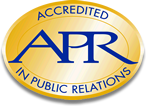 Editor’s note: This is the part of an ongoing series of articles from communicators who have earned their Accreditation in Public Relations, describing what led them to become accredited and what the accreditation experience was like for them.
Editor’s note: This is the part of an ongoing series of articles from communicators who have earned their Accreditation in Public Relations, describing what led them to become accredited and what the accreditation experience was like for them.
Since entering the professional world and at the beginning of each new year, I endeavor to set at least one personal and professional goal for myself. As I was considering my goals for 2014, one theme kept emerging — continuous learning. I decided my path to continuous learning was through obtaining my Accreditation in Public Relations (APR). For many years, I had been considering Accreditation, and knew, in order to grow my career, it was time to commit myself to the process of developing a deeper understanding of the strategic and business sides of public relations.
By Jan. 31, 2014, I had completed and submitted the APR application and received notification I was accepted. I immediately purchased a few of the recommended texts and signed up for the APR Online Study Course. I was given until Jan. 31, 2015, to be Advance through the Readiness Review and pass the Examination for Accreditation in Public Relations.
I began preparing by establishing key target and milestone dates for completing various activities. My goal was to complete the online study course by May, be Advance through the Readiness Review by July and sit for the Examination in the fall. Setting those targeted dates and goals was critical to keeping me on task and committed to my studies.
My online study group began meeting in February. Each week, we reviewed one of the 10 knowledge, skills and abilities (KSAs) tested on the Examination. Each KSA had requisite reading and activities, which I diligently completed. Through this online course I was able to connect with other APRs who graciously offered to serve as my mentors.
I completed the online study course in May, was Advanced through the Readiness Review on July 26 and scheduled an October date to take the Examination. I had heard many rumors about the difficulty of the Examination. I can confirm, at least for me, the rumors were all true. The hardest part for me was separating theory and what I had learned while studying for the Examination from practice and what I had actually applied in my PR roles for so many years. I missed passing by three percentage points.
Not to be discouraged, I quickly scheduled a call with one of my mentors who talked me through my experience and encouraged me to stay committed. I immediately signed up to retake the Examination in November. I also tweaked my study habits to focus more on creating and answering scenario-based questions for each KSA. The second time around I passed, and I am happy to report that I am now an Accredited PR professional.
Achieving Accreditation has been one of my greatest professional accomplishments. Going through the process has undoubtedly made me a better communicator. It also has given me more confidence in my daily work and ability to provide sound PR counsel to my association and our leaders.
I’ll leave you with the following six tips that were essential to my Accreditation success:
- Establish goals and milestones for completing your studies and the components of the Accreditation process.
- Join the online study group. The weekly Web meetings and corresponding activities and assignments helped guide me through the study process and apply what I was learning each week.
- Seek out a mentor(s). By the time I was finished, I was fortunate enough to have had three mentors who were all critical to my APR success.
- Attend the APR Mini Jumpstart class offered through your local PRSA Chapter. You will learn about the KSAs, all the APR resources available through your Chapter and meet other APR candidates in your area who are preparing for the Examination.
- The APR Study Guide is just that — a guide. Don’t solely rely on the guide to get you through your studies. The recommended texts on the APR bookshelf are just as important. I found Cutlip and Center’s “Effective Public Relations” to be the most helpful.
- Don’t be afraid to ask for help. Ethics and theory were the toughest KSAs for me to master. With consistent guidance from my mentors, I did exceedingly well on those KSAs.
Erin Wendel, APR, has been working in PR for more than 12 years, most of which have been spent working for national health care membership associations. For the past five years, she has been increasing the public’s awareness of the physical therapy profession while serving as the American Physical Therapy Association’s senior media relations specialist. She has previously worked for the American Pharmacists Association, the American Podiatric Medical Association, The Long & Foster Companies, and HealthSouth. She holds a bachelor’s degree in public relations from the University of Alabama.






